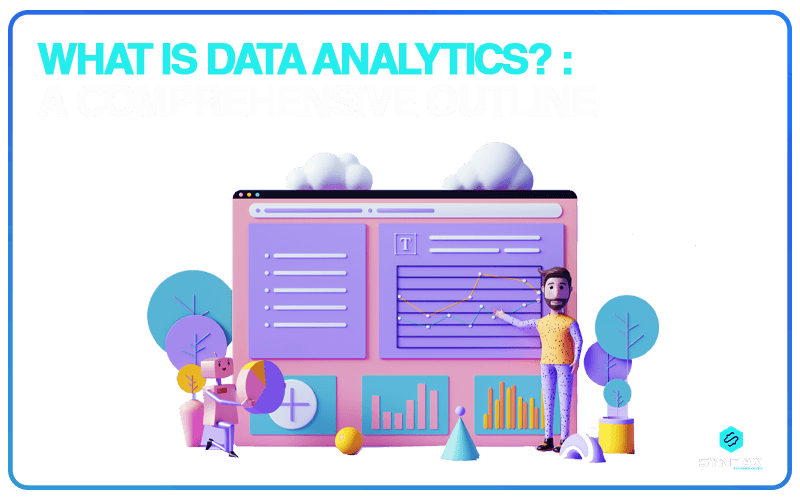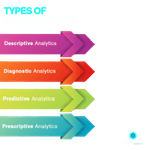Information is the oil of the 21st century, and analytics is the combustion engine. – Peter Sondergaard (Gartner Research)
The modern world and the activities taking place within it, is all about the generation of data. This data is in the form of valuable information, the understanding of which helps in propelling the society in a forward direction.
The twin notion of data and analysis as well as the usefulness it holds for mankind would well answer the question of What is Data Analytics and Why is Data Analytics important.
In this blog, you will learn Data Analytics in all its dimensions and we will cover some of the most important concerns which surround the Data Analytics definition.
What is Data Analytics?
In the simplest of terms, Data Analytics would mean making sense of data available to you by analyzing raw data.
Data Analytics can be seen as a holistic discipline which deals with the management of data through its collection and storage as well as, with the techniques, processes and tools, which help in analyzing it.
The main purpose to learn Data Analytics is to discover patterns, valuable correlations, unseen trends, and consequently, extract meaningful insights which could help in undertaking business decisions, making predictions as well as improving its efficiency.
As is clear from the definition, the field owes much to the disciplines of mathematics, computer programming and statistics. It utilizes the tools and strategies of these parent disciplines in order to derive meaning from historical data in the pursuit of making predictions and improving performance.
To learn Data Analytics would mean to understand the diverse data management tools including data transformation, data mining, data modelling, data cleansing and more.
The process of Data Analytics is facilitated with the help of some use tools. In order to know more about them; check out our blog on “Data Analytics Tools“
How to Learn Data Analytics?
To learn Data Analytics, one must strive for excellence in moving forward on a specific learning path. This would include the possession of necessary qualifications, cultivation of requisite skills and adopting the different roles and responsibilities, correspondent to the position of a Data Analyst.
In general, the role of a data analyst would include the following responsibilities:
- Procure Insights from Data: Data analysts need to derive meaning from data with the aim of analyzing it, in line with the requirements of the business.
- Produce Reports: Data analysts have the responsibility to generate findings in the form of reports which help other individuals to decide upon the further course of action.
- Indulge in Market Analysis: Data analysts need to perform an analysis of the market in order to make sense of the strengths and shortcomings of its competitors.
- Improve Business Performance: The shift to a client centric model of business, has required data analysts to utilize data analysis for improving business performance in line with the requirements and needs of the customers.
Consequently, one can learn Data Analytics, by involving oneself in inappropriate academic courses which help in the cultivation of specific skills.
Some of these data analysis skills are
- Sound understanding of statistical and mathematical concepts
- Capability to work with data models and data packages
- Knowledge of different programming languages including Python and others
- Sound knowledge of SQL databases
- Comprehensive understanding of the fundamentals of Web Development
- Knowledge of Microsoft Excel
- Being able to understand processes such as data mapping, data management, data manipulation and so on
The field of Data Analytics is one of the fastest growing domains within the tech industry. Data Analytics application finds its meaning within numerous sectors and is increasingly being considered as pivotal in increasing business productivity and efficiency.
Are you an aspiring Data Analyst? Are you confused about how to make it into the Data Analytics field? You may like these articles:
“How to become a Data Analyst without a Degree? A Step-by-Step Guide“
“How to become a Data Analyst with No Experience? Know with Us“
“How to become a Big Data Analyst? Come Find the Answers“
We, at Syntax Technologies, offer you an opportune chance to become an expert in the field. Know what is Data Analytics, why is Data Analytics important, understand Data Analytics basics and much more.
Enrol now for our Data Analytics course and land in your dream job as a Data Analyst.
Why Data Analytics?
Data Analytics holds infinite possibilities within the business world. Data Analytics application is widespread and far-reaching, cutting across different sectors of the economy.
In understanding why Data Analytics is important, it is worthwhile to consider the question in light of the value which analysis of data provides to business enterprises.
Some of the most important usages of Data Analytics in business are:
- Revamping the process of Decision Making: Data analysis is based on factual information and hard core data and is thus able to eliminate the possibility of speculation and conjectures. Instead of the rudimentary trial and test method, it gives the decision makers an opportunity to develop campaigns, products and content, in a more precise and tailored fashion. This helps in reducing the margin of error in decision making.
As per the research conducted by the Gartner Institute, ?increased advanced analytics capabilities are rapidly shifting the early-stage venture investing strategy away from gut feel and qualitative decision making to a more modern platform-based quantitative process?.
This is a valuable Data Analytics application within the field of investment as it helps in developing models which are capable of determining the outcome and viability of investments within short periods of time.
- Improved Customer Service: The business model has shifted to a client centric model and in order to stay afloat, it is imperative for business enterprises to contour their services as per the needs of the customers. Data Analytics is of great utility when it comes to providing the business leaders with precise understanding of the needs, interests and concerns of the customers.
- Efficiency in Operation: As mentioned before, analysis of data helps in lessening the margin of error in decision making. This implies that instead of trying and testing too many things, business enterprises can go with the option with the greatest probability to resonate with the needs of the customers. This helps in reducing operation costs.
- Competent Marketing: Deriving insights from the performance of campaigns is essentially based on the fundamental idea of Data Analytics. These insights not only help in tailoring the campaigns, but also help in acquiring more leads and consequent conversion; thus perfecting the process of marketing. This highlights the importance of Data Analytics in marketing.
The case of the Titan Company is a clear indication that Data Analytics can be extremely helpful within the field of marketing. It was reported that Data Analytics was a major propeller in augmenting the revenue of the Company. This was achieved because of a number of reasons.
Data Analytics was crucial in giving the Company an idea of the best-selling as well as the non-performing products and helped them in deciding upon the right ones for sale. Predictions made possible through Data Analytics helped it to reach out to the customers with the right offer of the right product at the right time. Moreover, Data Analytics has been useful in sales forecasting as well as determining the location of a store.
The above mentioned points clearly hint at the utility which Data Analytics hold for big or small, existing or upcoming business enterprises. It establishes the idea that if one happens to learn Data Analytics, it would only open up manifold opportunities for the person concerned.
Data Analysis Basics: Its Types
The answer to what is Data Analytics might seem to be a straightforward one. However; there are different types of Data Analytics.
Descriptive Analytics
Descriptive Analytics is concerned with the ?what?. It aims at elucidating the current state of affairs by extracting patterns and trends through data analysis.
Diagnostic Analytics
Diagnostic Analytics is concerned with the ?why?. It uses insights gathered through descriptive analytics, in order to trace the cause or factor which accounted for the existing state.
Predictive Analytics
Predictive Analytics is concerned with the future. This kind of analytics utilizes data of descriptive and diagnostic analytics and subjects it to different statistical models and tools, in order to arrive at tentative predictions about the future. It is also referred to as advanced analytics.
Prescriptive Analytics
Prescriptive Analytics is concerned with what is to be done. This kind of analytics utilizes different data analytics techniques in order to suggest viable solutions for achieving the predicted goals and outcomes.
Data Analytics Tools
Data Analytics application is made possible through the usage of diverse tools and programming languages which facilitate this process of analysis. Any response to the question of what is Data Analytics can at best be incomplete without the consideration of these tools. In this blog, we are going to consider seven of these most common tools.
- Python: It is an open-source object-oriented programming language which supports an array of libraries for data modeling, data manipulation and data visualization.
- Tableau: It is an analytical tool which helps in data visualization. It provides for interactive presentation of data, dashboards and report building, highlighting trends and insights.
- R Programming: It is a programming language which is largely used for statistical and numerical analysis.
- Apache Spark: It is a Data Analytics engine which provides for the processing of data in real-time as well as execute complex analytics by making use of machine learning algorithms and SQL queries
- Power BI: It can be regarded as one of the foremost tools of business intelligence, imbued with a simple ?drag and drop? functionality. It has features which are visually appealing to data and supports a plethora of data sources. The tool would allow one to raise questions to data and derive immediate insights
- SAS: It is a software for statistical analysis which has diverse features. It is capable of facilitating the process of writing SQL queries, performing analytics, building machine learning models, visualizing data as well as performing statistical analysis.
- QlikView: Imbued with features of in-memory storage and interactive analytics; QlikView can help in analyzing a staggering amount of data and use the insights for supporting the process of decision making. It provides for interactive guided analytics and social data discovery.
While recruitment at different Data Analytics positions might have its own set of eligibility requirements; knowledge of Data Analytics basics in terms of its fundamental tools, is indispensable.
Syntax Technologies bring to you an attractive opportunity to cultivate the necessary skills required to be a data analyst. Right from knowing what is Data Analytics to learning some of its most important tools like SQL, Python, Power BI, Tableau, ETL and so on; we offer you a complete package to upgrade your propensities.
Data Analytics Process
Analyses of data lie at the heart of the Data Analytics definition. However, this process follows a certain trajectory which has been summed up below.
Identification of the Problem
This step would encompass understanding a problem within a business enterprise, demarcating the objectives and goals to be achieved and drafting a viable solution for solving the problem.
Collection of Data
This step would involve collection of relevant data from all possible sources in order to address the problem.
Organizing and Data Cleaning
The gamut of data collected is most likely to be in an unrefined and fuzzy form. It would be required to organize it as well as clean it by removing all forms of irrelevant, redundant and unwanted bits, in order to make it conducive for analysis.
Analysis of Data
This step is the final rung of the Data Analytics ladder wherein the professional applies the different Data Analytics tools, techniques and strategies in order to analyze data, derive insights from it and consequently, speculate future outcomes as well as generate feasible solution to the problem concerned.
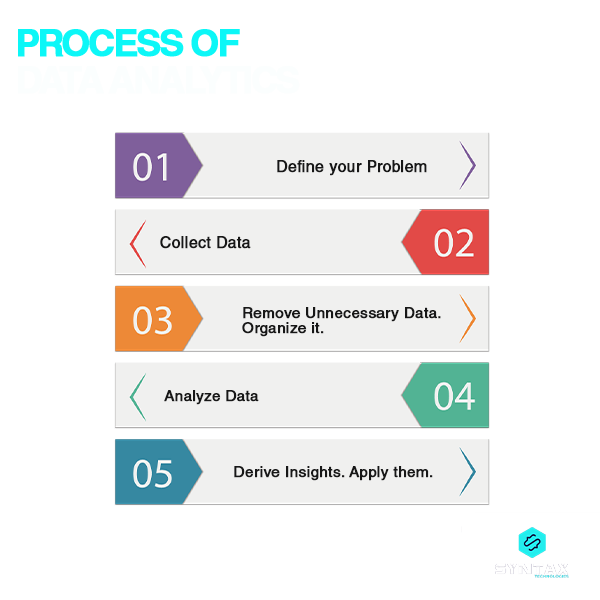
How to get into Data Analytics: The Job Market
The Data Analytics job landscape is immensely promising. Skilled professionals within the field can enjoy a pertinent benefit and that being the availability of career positions across multiple industrial sectors. Consequently, it has evolved as a rewarding career option.
Learning Data Analytics can result in the possibility of earning some of the most lucrative job titles like: Data Analyst, Data Scientist, Data Engineer, Business Analyst, Data Analytics Consultant, Data Journalist, Data Visualization Specialist, Product Analyst, Database Admin, Data System Developer, Marketing Analyst, Functional Analyst and so on.
The average salary for the post of a junior Data Analyst is estimated to be around $49,764; while for a Data Analyst might be around $75,286 and $96,970, for a senior Data Analyst.
The position of a Data Scientist is an extremely lucrative one with the average salary in the range of $91,494 – $122,450.
The median salary of Data Engineers is almost comparable to that of Data Scientists and is estimated to be at $90,963; while the average salary of a Business Intelligence Analyst is estimated to be at $95,838.
Professionals who learn Data Analytics and end up earning the designation of a Quantitative Analyst, might earn a median salary of around $82,879; $67,353 for an Operations Analyst and $66,571 for a Marketing Analyst.
Know more about some of the best job opportunities within the Data Analytics field; check out our blog on “Top 10 High Paying Data Analytics Jobs in 2023“
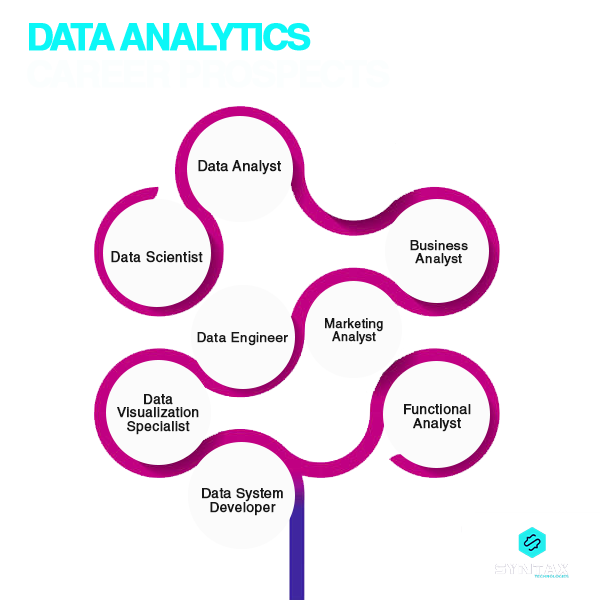
Data Analytics Application
In this section, we would discuss some of the sectors within which Data Analytics has evolved as a vital operational process.
- Data Analytics in Retail: Data Analytics is quite beneficial to retailers as it aids them in comprehending the buying habits and needs of their customers. This can be utilized in recommending new products, predicting trends and consequently, boosting business.
- Data Analytics in Banking: Financial institutions utilize Data Analytics to figure the churn out rate of customers as well as probable loan defaulters. Detection of fraudulent transactions is also facilitated through Data Analytics.
- Data Analytics in Agriculture: The process of farming has increasingly become data driven. Data Analytics has paved the way for smart farming as farmers are being able to use data to calculate fertilizer demand, harvest yields, cost savings and are even able to identify strategies for future crops.
Data Analytics in Accounting: Data Analytics might be incorporated by accountants in their work, which could be helpful in providing for assessment of estimates, prediction of audit outcomes and issues and can be a fundamental base for managerial decision making.
Conclusion
By the end of this blog, I am sure that even if you have not been able to delve into the intricacies of the domain of Data Analytics in its entirety; you would definitely be convinced of one thing. This pertains to the answer of what is Data Analytics and that it is a phenomenon with a potential to revolutionize industries, cutting across sectors.
Our dependence on devices and systems have only augmented the quantum of data generated. It would be futile to abandon them, even when they have tremendous potential for streamlining economic activities. It is precisely this understanding which provides an answer to the question of why Data Analytics is important.
We, at Syntax Technologies, bring to you the exciting opportunity to learn Data Analytics from the comfort of your home. You can be a part of this educational and informative online program which would help you to acquire new skills in consonance with the existing requirements of the tech industry.
